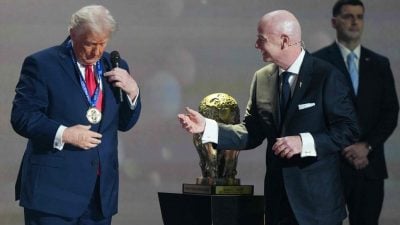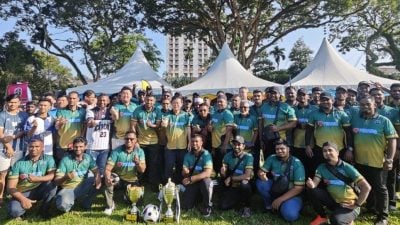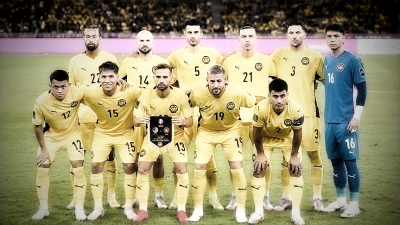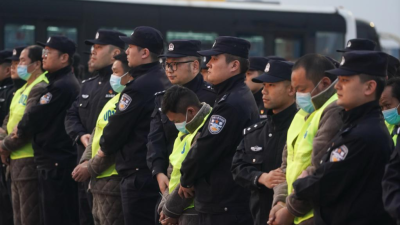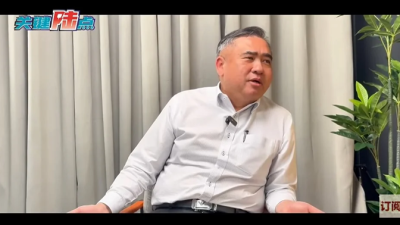
Malaysia’s recent football citizenship scandal has reopened old wounds for thousands of stateless Malaysians.
On 26 September, the International Federation of Association Football (FIFA) announced that it had punished the Football Association of Malaysia (FAM) and seven players for breaches of Article 22 of the FIFA Disciplinary Code (FDC) on forgery and falsification.
Its detailed investigation showed that FAM had submitted falsified documents to confirm the players’ eligibility to play for Malaysia.
The seven foreign-born footballers from Argentina, Brazil and Spain had been granted Malaysian citizenship. They are Gabriel Felipe Arrocha, Facundo Tomas Garces, Rodrigo Julian Holgado, Imanol Javier Machuca, Joao Vitor Brandao Figueiredo, Jon Irazabal Iraurgui, and Hector Alejandro Hevel Serrano.
They were fined, and given a 12-month suspension from all football-related activities, effective immediately.
Harimau Malaya CEO, Robert Douglas Friend, expressed his shock at FIFA’s sanctions but many Malaysians are more shocked.
Out of 11 players, seven are foreigners, including the CEO. Malaysians joked that the football team resembled a mini United Nations.
Many Malaysians recall with pride, football legends like Mokhtar Dahari, “Towkay” Soh Chin Aun, Santokh Singh and “Spiderman” Arumugam.
They brought honor to Malaysia. Why can’t we nurture and invest in home grown talent? This is a failure of long-term planning.
Why did the National Registration Department (NRD) and our Home minister abuse their powers by naturalizing these foreign players.
Was the 10-year residency requirement before becoming citizens observed? Can they speak Malay as required in the constitution? Can they sing Negaraku?
Many Malaysians questioned their citizenship status and asked how they were easily granted Malaysian citizenship.
Children whose Malaysian mothers gave birth to them whilst overseas are denied citizenship.
The Penan or Orang Asli who live in the ulu, have no financial means to register the birth of their children born in the interior. They are then told their children are stateless.
Some Malayans born during the Emergency of 1960 waited over fifty years for citizenship; unlike these foreigners.
Human rights Lawyer, Eric Paulsen, questioned the legality of Article 19. He said that acquiring citizenship through lineage for those whose forefathers were born or were permanent residents in the territory that is now Malaysia, is not found in Article 19.
First FAM said it was a technical error, then when it looked like they had no leg to stand on, FAM cited the Official Secrets Act (OSA).
When he was in Sungei Buloh, and a member of the then Opposition, Anwar Ibrahim said, “The plight of stateless children in Malaysia is ‘appalling’ and described the government’s indifference to it, as ‘shameful.’”
Now that he is prime minister, Anwar’s Madani administration has done little to help the thousands of stateless Malaysians.
The FAM citizenship scandal reveals how applications for Malaysian citizenship is laced with hypocrisy, and applied with double standards.
Ten points emerge from the scandal:
1. The footballers’ fast-track citizenship allowed them to represent the national team. This has angered stateless individuals who have lived in Malaysia their entire lives but are still denied recognition.
2. Stateless Malaysians feel abandoned, like Fandi Nukizan aka Ijan, a 22-year-old Bajau Laut youth from Semporna, Sabah. Many applications for citizenship were rejected or took decades to be approved. Many questioned how the government could trace the footballers’ supposed heritage and yet failed to recognize communities rooted in Malaysia for generations.
3. There are over 10,000 stateless people in Peninsular Malaysia and activists believe the true number nationwide is in the hundreds of thousands. Many are children of Malaysian parents, or from indigenous or nomadic communities.
4. FIFA sanctions have helped to expose the shameful actions of FAM on a global scale. FAM was fined RM1.9 million and the seven players were also fined and banned from playing, with immediate effect.
5. Stringent rules when applying for Malaysian citizenship only applies tor ordinary applicants. Stateless people face almost impossible documentation requirements such as birth records, midwife letters, eyewitness statements, and village leader approvals. Even after submitting proof, many applications are rejected, with no explanations provided.
6. The double standards in vetting have angered Malaysians. The Home Minister Saifuddin Nasution claimed the footballers were “thoroughly vetted”; but activists like Yap Xiang from Borneo Komrad argue that even successful cases usually take years to process. The government appeared to be lenient with footballers but not with stateless people.
7. The human cost of statelessness means that children cannot enroll in schools and they are vulnerable and exploited as cheap labor. They have no or limited access to healthcare, education, and legal protections.
8. The economic argument falls flat in that the government may justify granting citizenship to foreign players on the basis of “economic contribution.” However, a former stateless youth, Wong Ku Kui said that Malaysia actually loses billions in ringgits in taxes because stateless people cannot work legally.
9. The scandal has shown the need for clear SOPs and transparency. Despite promising reforms, the Madani government has failed to introduce clear guidelines for citizenship applications. Many applications fail because of “insufficient documentation”. This encourages mistrust.
10. The need for rights-based citizenship should be prioritized by the government, instead of subjecting the stateless with actions that lower their human dignity.
The FAM citizenship scandal about “heritage” players is not just another sports story.
It reveals how applications for Malaysian citizenship is laced with hypocrisy, and applied with double standards—quick for foreign footballers, but painfully slow for some Malaysians born overseas or to mixed-marriage parents, and those born in the ulu.
The scandal is also a story about a lack of leadership, lack of long-term investment in sports and our youth, and how in the pursuit of fame, glory, perks, and position in football rankings, FAM is prepared to sacrifice the body’s integrity and principles.
(Mariam Mokhtar is a Freelance Writer.)
ADVERTISEMENT
ADVERTISEMENT






